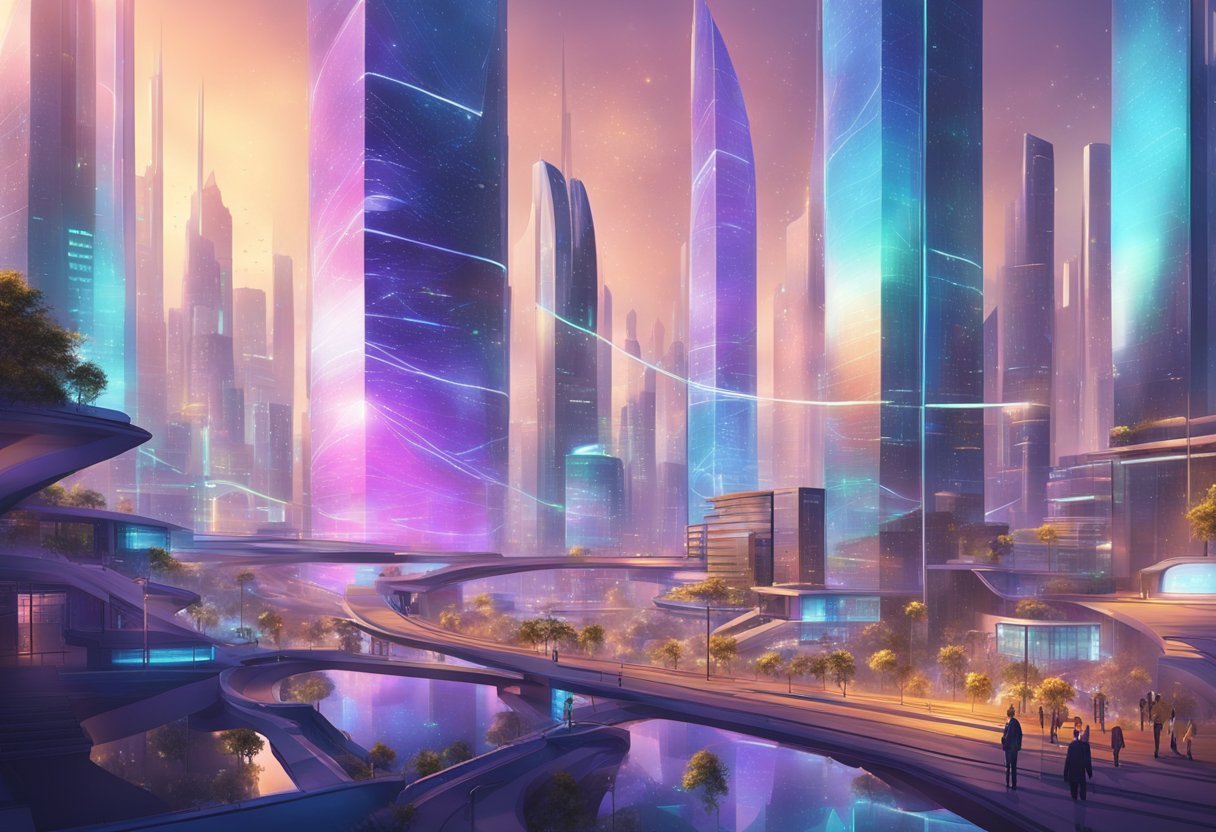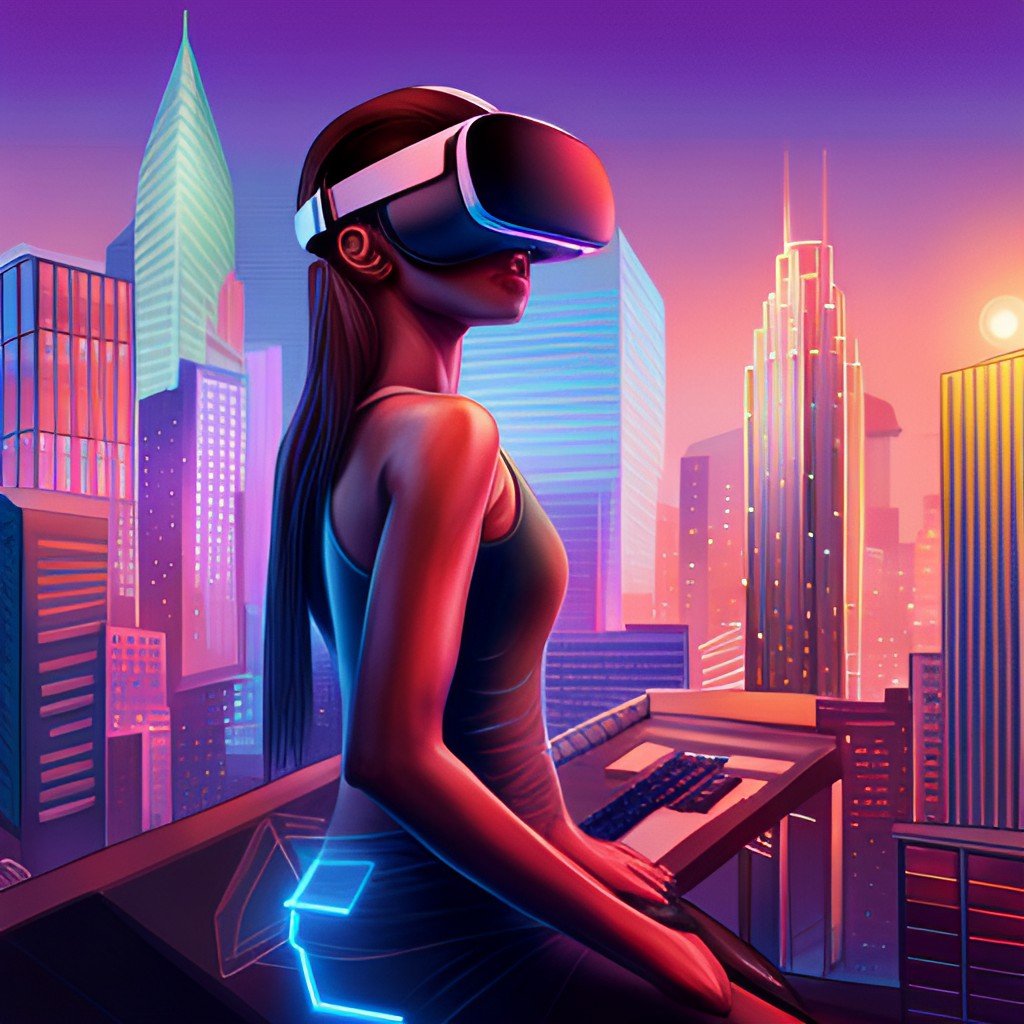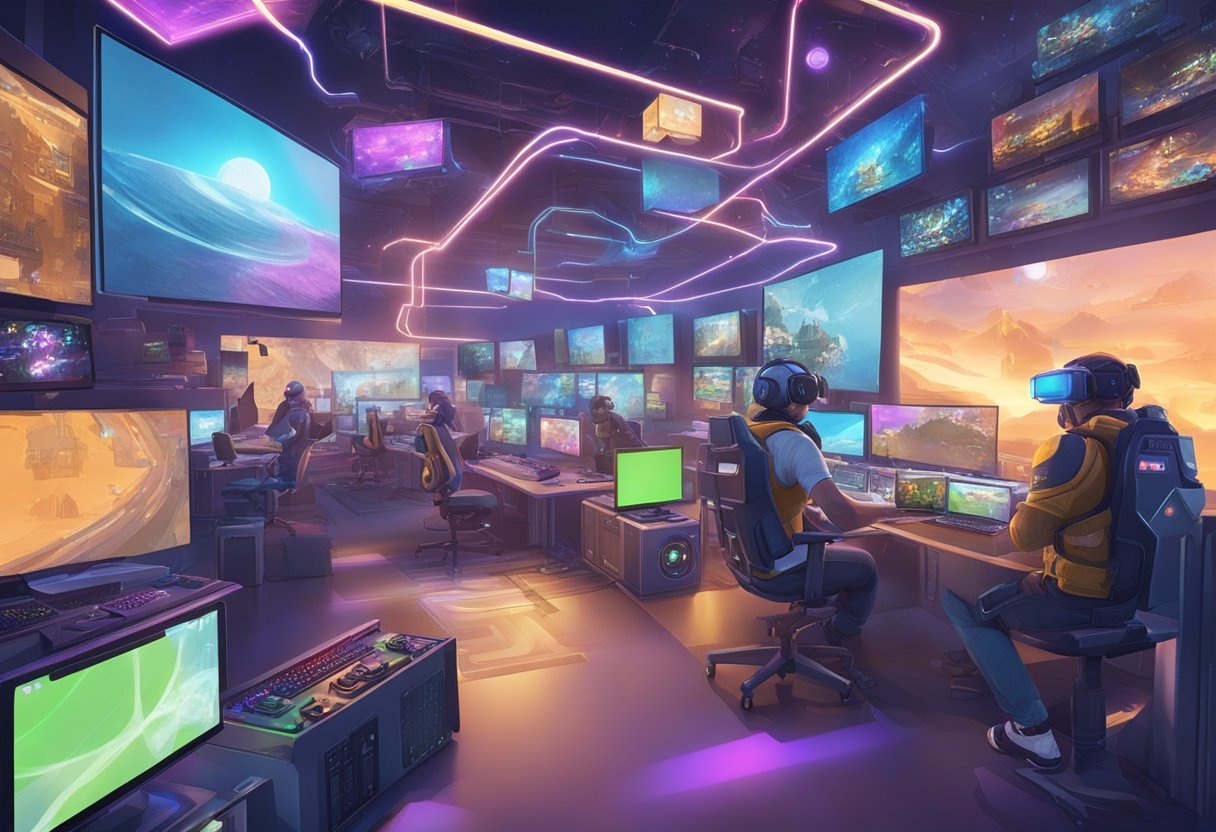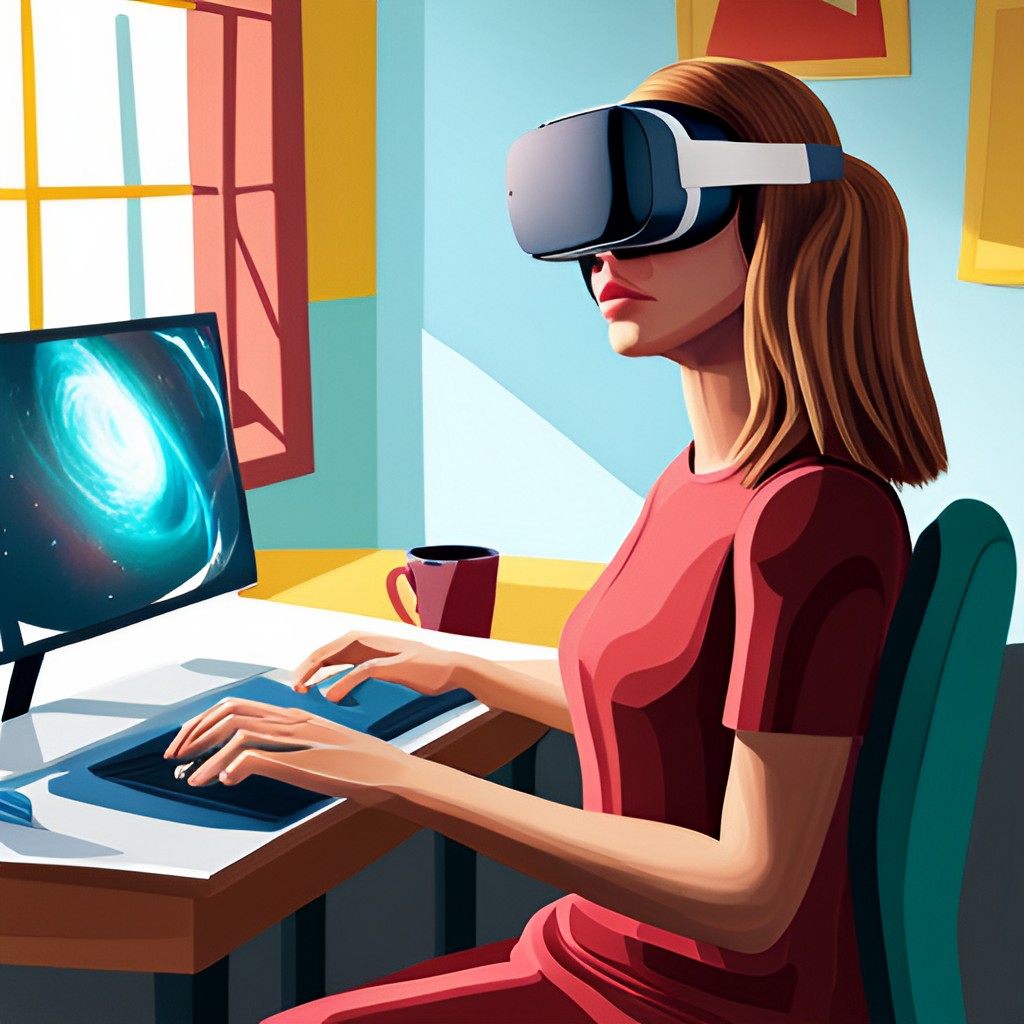The concept of living in a metaverse is no longer a far-fetched idea, as technology has advanced to a point where it is becoming a reality. The metaverse is a virtual space where people can interact with each other in a three-dimensional environment using avatars. This space is created by combining virtual and augmented reality technologies, and it is expected to be the next big thing in the tech world.
Mark Zuckerberg, the CEO of Facebook, is one of the biggest advocates for the metaverse. He believes that it will be the next evolution of the internet, and his company is investing heavily in its development. Experts predict that by 2030, people will be living in the metaverse, and it will have a significant impact on various aspects of their lives, from entertainment to education and even work.
As exciting as the prospect of living in the metaverse may be, there are still many questions that need to be answered. How will people experience the metaverse, and what kind of economy will it have? What will the future of the metaverse look like, and how will it impact the world we live in today? This article will explore these questions and more, providing a comprehensive overview of the metaverse and its potential impact on society.
Key Takeaways
- The metaverse is a virtual space where people can interact with each other in a three-dimensional environment using avatars.
- Mark Zuckerberg is a big advocate for the metaverse, and experts predict that people will be living in it by 2030.
- The metaverse has the potential to impact various aspects of people’s lives, including entertainment, education, and work.
Will we live in the Metaverse?

The concept of the Metaverse has been around for a while, but it has recently gained more attention due to its potential impact on our lives. The Metaverse is a virtual world where people can interact with each other and digital objects in a realistic way. It is a fully immersive experience that could change the way we live, work, and play.
Who lives in the Metaverse now?
Currently, the Metaverse is still in its early stages, and only a small number of people are actively using it. However, there are already some virtual worlds and games that offer a glimpse into what the Metaverse could be like. For example, Second Life, a virtual world launched in 2003, has been described as a precursor to the Metaverse. It allows users to create avatars, interact with other users, and buy and sell virtual goods.
How can I live in the Metaverse?
To live in the Metaverse, people will need to have access to the necessary technology, such as virtual reality headsets and high-speed internet connections. They will also need to be comfortable with the idea of spending most of their time in a virtual world. Currently, the technology required to fully experience the Metaverse is still expensive and not widely available. However, as technology advances, it is expected to become more accessible and affordable.
When can people start living in the Metaverse?
It is difficult to predict exactly when the Metaverse will become a reality for most people. Some experts predict that it could happen within the next decade, while others believe it could take longer. The development of the Metaverse will depend on a variety of factors, including advances in technology, the availability of funding, and the willingness of people to adopt this new way of living.
In conclusion, while the Metaverse is still in its early stages, it has the potential to revolutionize the way we live, work, and play. As technology continues to advance, it is likely that more people will be able to experience the Metaverse in the future. However, it remains to be seen how quickly this will happen and what impact it will have on society as a whole.
Experiencing the Metaverse

The metaverse is a virtual world where users can interact with each other and the environment in a highly immersive way. The metaverse is still in its early stages, but it is already showing great potential for immersive and interactive experiences.
Virtual Reality and Augmented Reality in the Metaverse
Virtual reality (VR) and augmented reality (AR) will play a significant role in the metaverse. VR headsets and AR goggles will allow users to fully immerse themselves in the virtual environment and interact with it in a more natural and intuitive way.
The Role of Avatars
Avatars will be the representation of users in the metaverse. They will be digital versions of the users, and they will allow users to interact with each other and the environment. Avatars will be highly customizable, allowing users to create a digital representation of themselves that reflects their personality and style.
Interactivity and Immersion
Interactivity and immersion are the key features of the metaverse. Users will be able to interact with each other and the environment in a highly immersive way. The metaverse will be a place where users can connect, socialize, and have fun. The metaverse will also be a place where users can experiment with new digital spaces and experiences.
In conclusion, the metaverse is an exciting new space that is still in its early stages. It has the potential to revolutionize the way we connect, socialize, and experience digital content. With the rapid advancement of technology, the metaverse is becoming more and more accessible, and it is only a matter of time before it becomes a mainstream phenomenon.
The Metaverse Economy

The metaverse is set to revolutionize the way we work, learn, and profit. With the rise of virtual reality, people are slowly transitioning towards a more digital and immersive world. The metaverse economy is expected to unlock significant economic value across the world, and understanding the various aspects of this economy is crucial.
Understanding Virtual Assets
Virtual assets refer to any digital assets that hold value in the metaverse. These assets can range from digital goods, such as clothing and accessories, to virtual real estate. Virtual assets are expected to be a significant source of revenue for individuals and companies alike. In the metaverse, virtual assets are bought and sold using cryptocurrency and blockchain technology.
The Role of Blockchain and Cryptocurrency
Blockchain technology is expected to play a significant role in the metaverse economy. Blockchain technology provides a decentralized and secure way to store and transfer virtual assets. Cryptocurrency, on the other hand, is expected to be the primary means of exchange in the metaverse. Cryptocurrency provides a secure and efficient way to buy and sell virtual assets.
Non-Fungible Tokens (NFTs) in the Metaverse
Non-fungible tokens (NFTs) are unique digital assets that hold value in the metaverse. NFTs are used to represent virtual real estate, digital goods, and other unique assets. NFTs are expected to play a significant role in the metaverse economy, as they provide a secure and efficient way to buy and sell unique virtual assets.
In the metaverse, virtual storefronts and app stores are expected to be the primary means of selling virtual goods. Real estate in the metaverse is expected to be a significant source of revenue for individuals and companies alike. Venture capitalists are already investing in the metaverse economy, and the revenue generated from the metaverse is expected to grow exponentially in the coming years.
Overall, the metaverse economy is set to revolutionize the way we work, learn, and profit. The rise of virtual reality and the metaverse is expected to create new opportunities and unlock significant economic value. As the metaverse economy continues to grow, it is crucial to understand the various aspects of this economy and how it will impact our lives.
The Future of the Metaverse

The concept of the metaverse has been gaining traction in recent years, with many predicting that it could be the future of human interaction and even replace the internet as we know it. While the idea of a fully immersive virtual world has been explored in science fiction for decades, recent advancements in technology have made it a reality. In this section, we will explore the potential impact of the metaverse on society, as well as the challenges and controversies surrounding its development.
Potential Impact on Society
The metaverse has the potential to revolutionize the way we live, work, and interact with each other. It could provide a new platform for entertainment, education, and even environmental activism. For example, virtual reality could be used to create immersive educational experiences that allow students to explore historical events or scientific concepts in a more engaging way.
Additionally, the metaverse could provide a more sustainable alternative to our current way of life. By reducing the need for physical travel and infrastructure, it could help to mitigate the environmental impact of human activity. However, it is important to note that the development of the metaverse itself could also have environmental consequences, particularly if it relies heavily on energy-intensive technologies.
Challenges and Controversies
Despite its potential benefits, the development of the metaverse is not without its challenges and controversies. One of the main concerns is the potential for the metaverse to become a dystopian or even addictive environment. Critics argue that it could lead to social isolation and a lack of real-world human interaction, which could have negative consequences for mental health.
There are also concerns about the ownership and control of the metaverse. Currently, companies such as Linden Lab and Amazon are leading the way in developing virtual worlds, but there is a risk that they could become monopolies and exert too much control over the metaverse. Additionally, there are concerns about user-generated content and the potential for harmful or illegal activities to take place within the virtual world.
The Metaverse: A Dystopian or Utopian Future?
The future of the metaverse is still uncertain, and it could go either way. While it has the potential to be a utopian environment that promotes creativity, collaboration, and sustainability, it could also become a dystopian world that perpetuates inequality, addiction, and environmental degradation. Ultimately, the development of the metaverse will depend on the choices we make as a society, and it is up to us to ensure that it is a force for good.
Frequently Asked Questions
What is the Metaverse and how will it change our lives?
The Metaverse is a virtual universe where users can interact with each other in a shared space. It is a combination of virtual reality, augmented reality, and other immersive technologies. The Metaverse has the potential to change the way we work, learn, and socialize. It could allow us to connect with people from all over the world, attend virtual events, and experience new things in ways that were previously impossible.
How likely is it that the Metaverse will become a reality?
The Metaverse is already becoming a reality, with companies like Facebook, Google, and Microsoft investing heavily in the technology. While there are still technical and social challenges to overcome, many experts believe that the Metaverse will become an integral part of our lives in the coming years.
What are some examples of companies working on the Metaverse?
Facebook’s Horizon Workrooms, Microsoft’s Mesh, and Roblox are just a few examples of companies working on the Metaverse. These companies are investing heavily in the technology and are working to create immersive experiences for users.
What are the potential benefits and drawbacks of living in the Metaverse?
The Metaverse has the potential to connect people from all over the world and create new opportunities for work, learning, and socializing. However, it could also lead to increased isolation and a blurring of the lines between reality and virtual reality. There are also concerns about privacy and security in the Metaverse.
How would the Metaverse impact our social interactions and relationships?
The Metaverse could change the way we interact with each other, allowing us to connect with people from all over the world and experience new things together. However, it could also lead to increased isolation and a blurring of the lines between reality and virtual reality.
What challenges would need to be overcome for the Metaverse to succeed?
There are many technical and social challenges that need to be overcome for the Metaverse to succeed. These include developing the necessary technology, creating immersive experiences that are accessible to everyone, and addressing concerns about privacy and security.
Are we living in a Metaverse?
While some people argue that we are already living in a Metaverse, this is not yet the case. The current state of virtual reality and augmented reality is still limited, and the Metaverse as it is envisioned today is still in development.
Will the Metaverse actually happen?
Many experts believe that the Metaverse will become an integral part of our lives in the coming years. While there are still technical and social challenges to overcome, companies are investing heavily in the technology and working to create immersive experiences for users.
Is the Metaverse supposed to replace real life?
The Metaverse is not intended to replace real life, but rather to complement it. It is envisioned as a new way for people to connect and experience the world, but it is not meant to replace the physical world.
How long until the Metaverse is real?
It is difficult to predict exactly when the Metaverse will become a reality, but many experts believe that it will become an integral part of our lives in the coming years.
Is the Metaverse a failure?
The Metaverse is still in development, and it is too early to say whether it will be a success or a failure. While there are many challenges to overcome, companies are investing heavily in the technology and working to create immersive experiences for users.




